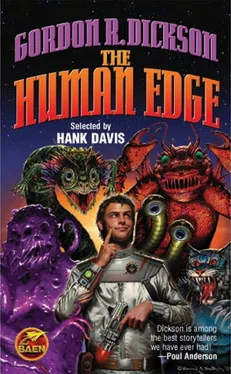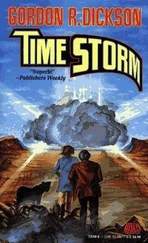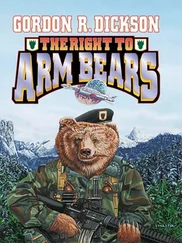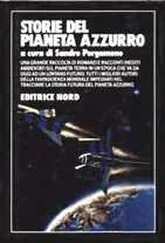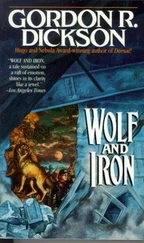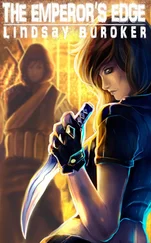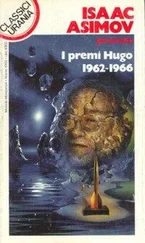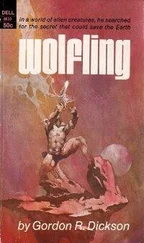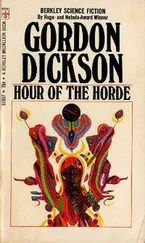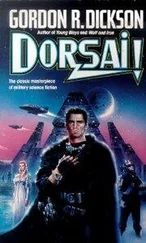“I believed you,” said Dormu.
The Jhan’s eyes stared. They widened, flickered, then narrowed down until they were nothing but slits, once more.
“You believed me? You knew he was a Morah?”
“I knew,” said Dormu. “I was Liaison Officer with the Intelligence Service at the time Edmonds was sent out—and later when his body was recovered. We have no missing agent here.”
His voice did not change tone. His face did not change expression. He looked steadily up into the face of the Jhan.
“I explained to the Morah Jhan, just now,” said Dormu, almost pedantically, “that through misapprehension, he had erred. We are a reasonable people, who love peace. To soothe the feelings of the Morah Jhan we will abandon our settlements, and make as many other adjustments to his demands as are reasonably possible. But the Jhan must not confuse one thing with another.”
“What thing?” demanded the Jhan. “With what thing?”
“Some things we do not permit,” said Dormu. Suddenly, astonishingly, to the watching Whin, the little man seemed to grow. His back straightened, his head lifted, his eyes looked almost on a level up into the slit-eyes of the Jhan. His voice sounded hard, suddenly, and loud. “The Morah belong to the Morah Jhan; and you told us it’s your privilege to play with their shapes. Play with them then—in all but a single way. Use any shape but one. You played with that shape, and forfeited your right to what we just buried. Remember it, Morah Jhan! the shape of Man belongs to Men, alone! ”
He stood, facing directly into the slitted gaze of Jhan, as the bugle sounded the last notes of taps and the screen went blank. About the docks, the Military Police lowered their weapons from the present-arms position.
For a long second, the Jhan stared back. Then he spoke.
“I’ll be back!” he said; and, turning, the red kilt whipping about his legs, he strode up the gangplank into his ship.
* * *
“But he won’t,” muttered Dormu, with grim satisfaction, gazing at the gangplank, beginning to be sucked up into the ship now, preparatory to departure.
“Won’t?” almost stammered Whin, beside him. “What do you mean… won’t? ”
Dormu turned to the marshal.
“If he were really coming back with all weapons hot, there was no need to tell me.” Dormu smiled a little, but still grimly. “He left with a threat because it was the only way he could save face.”
“But you…” Whin was close to stammering again; only this time with anger. “You knew that… that creation… wasn’t Edmonds from the start! If the men on this Outpost had known it was a stinking Morah, they’d have been ready to hand him back in a minute. You let us all put our lives on the line here—for something that only looked like a man!”
Dormu looked at him.
“Marshal,” he said. “I told you it was the confrontation with the Jhan that counted. We’ve got that. Two hours ago, the Jhan and all the other Morah leaders thought they knew us. Now they—a people who think shape isn’t important—suddenly find themselves facing a race who consider their shape sacred. This is a concept they are inherently unable to understand. If that’s true of us, what else may not be true? Suddenly, they don’t understand us at all. The Morah aren’t fools. They’ll go back and rethink their plans, now—all their plans.”
Whin blinked at him, opened his mouth angrily to speak—closed it again, then opened it once more.
“But you risked…” he ran out of words and ended shaking his head, in angry bewilderment. “And you let me bury it—with honors!”
“Marshal,” said Dormu, suddenly weary, “it’s your job to win wars, after they’re started. It’s my job to win them before they start. Like you, I do my job in any way I can.”
It’s hard to pick out a best or favorite story by an author as good and prolific as Gordon R. Dickson, but “On Messenger Mountain” would definitely make my short list. In this one, he adds ingredients from such milestones of sf as Murray Leinster’s “First Contact” and John W. Campbell’s “Who Goes There?” and comes up with a very different story from either of those classics. Someone once categorized conflict in fiction into three types—man against nature, man against man, and man against himself—and argued that the third type produced the “highest” quality of fiction. Whether or not that is true, this story certainly explores man against nature and man against man (not to mention man against alien and alien against nature), but might seem to ignore man against himself… until that very last line (and don’t go look at it now , dammit—read the story first!) that suddenly makes it clear what the story was really about.
It was raw, red war for all of them, from the moment the two ships intercepted each other, one degree off the plane of the ecliptic and three diameters out from the second planet of the star that was down on the charts as K94. K94 was a GO type star; and the yelping battle alarm of the trouble horn tumbled sixteen men to their stations. This was at thirteen hours, twenty-one minutes, four seconds of the ship’s day.
Square in the scope of the laser screen, before the Survey Team Leader aboard the Harrier, appeared the gray, light-edged silhouette of a ship unknown to the ship’s library. And the automatic reflexes of the computer aboard, that takes no account of men not yet into their vacuum suits, took over. The Harrier disappeared into no-time.
She came out again at less than a quarter-mile’s distance from the stranger ship and released a five-pound weight at a velocity of five miles a second relative to the velocity of the alien ship. Then she had gone back into no-time again—but not before the alien, with computer-driven reflexes of its own, had rolled like the elongated cylinder it resembled, and laid out a soft green-colored beam of radiation which opened up the Harrier forward like a hot knife through butter left long on the table. Then it too was gone into no-time. The time aboard the Harrier was thirteen hours, twenty-two minutes and eighteen seconds; and on both ships there were dead.
“There are good people in the human race,” Cal Hartlett had written only two months before, to his uncle on Earth, “who feel that it is not right to attack other intelligent beings without warning—to drop five-pound weights at destructive relative velocities on a strange ship simply because you find it at large in space and do not know the race that built it.
“What these gentle souls forget is that when two strangers encounter in space, nothing at all is known—and everything must be. The fates of both races may hinge on which one is first to kill the other and study the unknown carcass. Once contact is made, there is no backing out and no time for consideration. For we are not out here by chance, neither are they, and we do not meet by accident.”
Cal Hartlett was Leader of the Mapping Section aboard the Harrier, and one of those who lived through that first brush with the enemy. He wrote what he wrote as clearly as if he had been Survey Leader and in command of the ship. At any moment up until the final second when it was too late, Joe Aspinall, the Survey Leader, could have taken the Harrier into no-time and saved them. He did not; as no commander of a Survey Ship ever has. In theory, they could have escaped.
In practice, they had no choice.
* * *
When the Harrier ducked back into no-time, aboard her they could hear the slamming of emergency bulkheads. The mapping room, the fore weight-discharge room and the sleeping quarters all crashed shut as the atmosphere of the ship whiffed out into space through the wound the enemy’s beam had made. The men beyond the bulkheads and in the damaged sections would have needed to be in their vacuum suits to survive. There had not been time for that, so those men were dead.
Читать дальше
